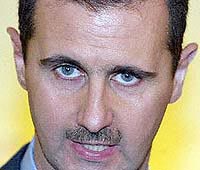Syrian opposition groups seek united front against Assad regime
Exiled Syrian opposition figures formed a united front Friday calling for a transitional government to prepare for the overthrow of President Bashar Assad's regime.

Calling Assad's regime "despotic and corrupt," they underlined the need for opposition groups in and outside Syria to close ranks to plan for "the desired change and build a democratic system."
The meeting was called by Syria's former Vice President Abdul-Halim Khaddam and Ali Sadr el-Din Bayanouni, head of the banned Muslim Brotherhood.
Khaddam broke with Assad last year and fled to Paris. The meeting included diverse groups including former members of the ruling Baath party along with representatives of the outlawed the Brotherhood together with liberal and democratic groups and a delegate from the Kurdish minority.
They formed a "front of national salvation" and urged the formation of a six-month transitional government to "take up the reins of power at the appropriate moment," protect the country from chaos and prepare for elections.
The proposed transitional government would abolish the 1963 state of emergency and release all political prisoners, they said in a statement.
"The front calls upon all opposition forces to cooperate with it to bring about the desire of the Syrian people for change," they said in a statement after a two-day meeting in the Belgian capital.
They pledged to work together to spread their message both within Syria and among other Arab countries. They issued no call for revolt or protests within the country.
Khaddam was for many years Syria's top official in Lebanon and was a member of the Baath Party's regional command, its most influential body, for almost 30 years.
He represents an old guard long seen as wary of Assad, who became president after the death of his father and predecessor, Hafez Assad, in 2000.
Khaddam has accused Assad of responsibility for last year's assassination of former Lebanese Prime Minister Rafik Hariri. Khaddam was a close friend of Hariri who was killed along with 20 other people in a massive truck bombing in Beirut on Feb. 14, 2005. A U.N. probe has implicated top Syrian and Lebanese security officials in the assassination, reports AP.
O.Ch.
Subscribe to Pravda.Ru Telegram channel, Facebook, RSS!


